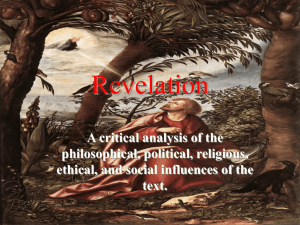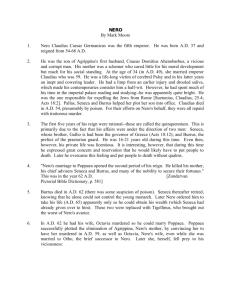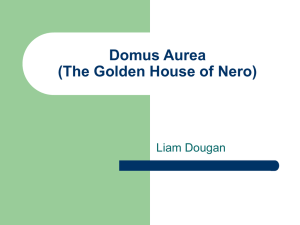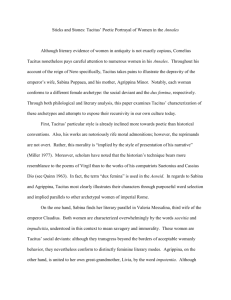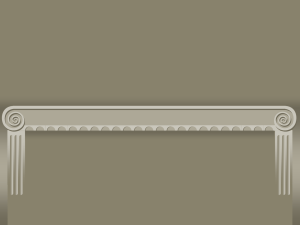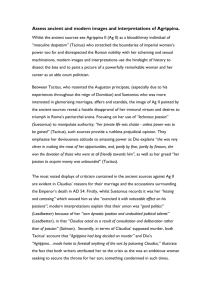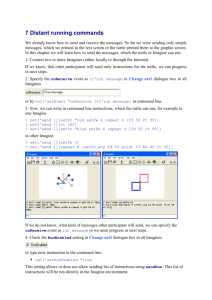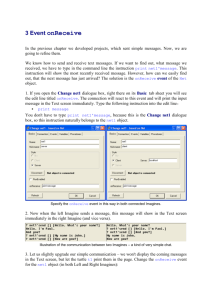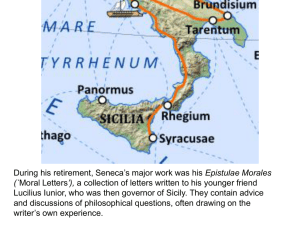Document
advertisement
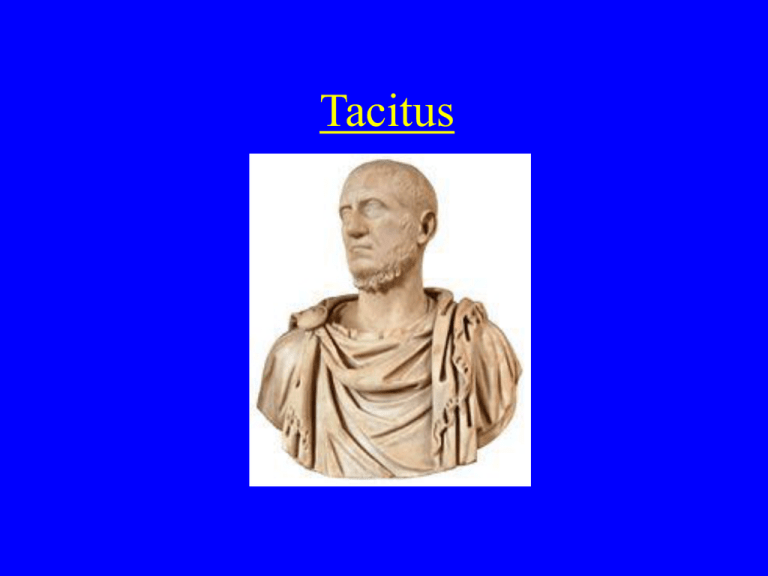
Tacitus Life of Cornelius Tacitus • We do not know who his parents where, year of birth or death or praenomen • Born c. A.D. 56 of Gallic or North Italian stock • Began his official career under Vespasian (69-79 A.D.) • Married Agricola’s daughter in 77 and became praetor in 88 Life of Cornelius Tacitus continued • Away from Rome when Agricola died in 93 • Returned to witness last years of Domitian’s savagery • Consul suffectus in 97 • Delivered funeral oration over Verginius Rufus • In 100 led Pliny in prosecuting Marius Priscus for extortion Life of Cornelius Tacitus continued • May have governed a military province • Was proconsul in Asia (Turkey) in 112/113 • Not known whether he lived to finish the Annales • Died sometime after 115 A.D. From MS. of Agricola Tacitus’ Writings: Agricola • Agricola published in 98 A.D. describes life of his father-in-law • Most of it concerns Agricola’s achievements in Britain • A laudatio of Agricola and an apology for the loyal administrator under Domitian Tacitus’ Writings: Germania • Also published in 98 A.D. • Description of the tribes north of the Rhine and the Danube • An ethnological treatise • Themes include that of the noble savage, contrasting the Germans with the corrupt Romans • Also writes of the constant threat to the Empire that they pose Tacitus’ writings: Dialogus • Discusses decline of Roman oratory • Shows mastery of argument and characterization • May be dated to around 100 Tacitus’ Writings: Histories • No manuscript title • Begins in 69 and presumably ends with Domitian’s assassination in 96 A.D. • Four books and parts of fifth survive • Give a comprehensive picture of Civil War, full of intrigue and incompetent rulers Tacitus’ Writings: Annales • History of the Julio-Claudian emperors after death of Augustus (14 A.D.) • We know of 16 books • Arranged annalistically by year • Each year contains sections on home and provincial affairs • Tacitus used as his sources historical works now lost, on public records, and on own experience Tacitus’ Writings: Annales • Tacitus reacts against the Principate and looks back longingly at “free” institutions of the Republic • Power centered in one man blunted the moral sense of even experienced rulers • The Emperors neglected military glory • Laments lack of independence and courage of most nobles and senators Portrait Bust of Nero Annales continued • Views wrath of the gods working to punish • “His task is gloomy, to record the suspicions of Tiberius, played upon by informers; Claudius the helpless tool of freedmen or wives; the vanity and vice of Nero - all resulting in baseless accusations and judicial murders.” OCD Tacitus’ Style • • • • Vocabulary large and varied Words grouped in strange and striking order Uses new word forms and echoes of poetry Prefers shortness of sentences and rapidity to periodic structure • Omits verbs, compresses • Intensity and brevity are characteristic of his style Tacitus’ Style continued • Employs an elevated style, powerful style • Suits his belief in dignity and moral effect of history • Keen sense of irony The Manuscript Tradition • Hangs on a slender thread • Was little read in succeeding centuries • Reappears in 9th Century among monks at Fulda • We depend upon one manuscript for Annals 1-6 (discovered about 1510) • And one for Annals 11-16 and Histories 1-5 A Short Biography of the Emperor Nero Nero’s Reign • Emperor Claudius had married his niece Agrippina • She persuaded him in 50 to adopt her son Nero • Claudius died in 54, probably poisoned by Agrippina • Nero succeeded him and reigned until 68 Nero’s Reign • Seneca was appointed tutor to young Nero and Burrus made prefect of Praetorian Guard • With Nero’s succession in 54 Seneca became political advisor • First 8 years empire enjoyed good governemnt • Death of Burrus and retirement of Seneca in 62 left Nero uncontrolled Nero and Agrippina in an unflattering 19th century engraving Nero’s Reign • Otho, friend of Nero, encouraged him to free himself from his imperious mother • Poppea, Otho’s ambitious wife, wished to marry Nero • She planned to eliminate both Agrippina and Nero’s wife, Octavia • In 59 A.D. Nero had Agrippina murdered Portrait Bust of Poppea A.D. 54-68 Nero’s Reign continued • Octavia was divorced and murdered • Poppea married Nero and in 63 she married him and bore him a daughter who soon died • Poppea died in 65 • Conspiracy to assassinate him and make Calpurnius Piso emperor was betrayed in 65 • Piso and his accomplices were executed or committed suicide • This included Seneca and Petronius Peter Paul Rubens. The Death of Seneca. c.1615 Nero’s death in 68 A.D. • Praetorians proclaimed Galba emperor and deserted Nero • He fled from Rome and committed suicide
